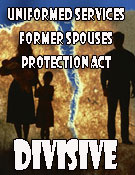 Uniformed Services Former Spouses Protection Act creates bad blood over division of military retirement pay
Uniformed Services Former Spouses Protection Act creates bad blood over division of military retirement pay
When the rings come off during a divorce hearing, who gets what often is a point of contention. But simmering bad blood about a 1982 law allowing the division of military retirement pay has created unending controversy among advocates and dissenters alike.
Known as the Uniformed Services Former Spouses Protection Act, the law was created in the wake of a controversial U.S. Supreme Court ruling upholding the ban on dividing nondisability military retirement pay in divorce settlements, as is allowable with civilian pensions or retirement funds.
Congress acted quickly to pass a federal law paving over the court findings. In doing so, it allowed state authorities in divorce cases to mandate up to a 50-percent division of military retirement pay not awarded because of disability.
Opponents say the law unfairly classifies military retirement as property. They say because retirees are still subject to military law and recall to service, they are receiving not retirement but reduced pay for reduced services. Military retirement is earned, they say, through one person’s sometimes life-threatening labor…
Supporters of the law cite the difficulty military spouses have maintaining a career while relocating every two to three years. They also argue spouses play a vital role in furthering military careers and are entitled to some of the rewards of retirement. Denying the spouses those rewards, they say, constitutes a special exception for military members unheard of for civilians.
Bitter on both sides 
Personal testimony from both sides often is emotional. If one side offers the example of a 15-year spouse traded in for a younger model and shown the door, the other side’s rejoinder is a married service member discovering a spouse’s long-term infidelity and still being forced to share his retirement pay.
“A good part of the reason (the FSPA) is such an emotional issue is because the economic world has changed,” Diane Mazur, a professor at the University of Florida Law School, said via e-mail.
“Over the last 20 (plus) years,” she wrote, “the major equity producer for families may be the family home. Military people are very unlikely to be long-term homeowners and therefore to benefit from increased property values.
“When career military people divorce, the future pension benefits may be the only asset of any value, and so all the pressure is put on the pension. What makes it economically possible for civilians to divorce is often the ability to sell the home and split the profit.”
Opposition to the law takes on many shapes — ranging from lobbying for amendments to requesting that the whole law be scrapped. But those fighting the law generally agree on the root causes of their opposition.
First, when retirement funds are divided, they are not distributed relative to the retiree’s pay grade at the time of the divorce. Instead, the funds are divided based on the pay grade at the time of retirement. This means if a service member is divorced as a captain and later retires as a general, the spouse will be entitled to a portion of the retirement based on a general’s pay — not a captain’s.
Second, there is no minimum time limit on the marriage before a spouse qualifies for a portion of the retirement. While formulas for designating awards have been suggested, and even are used in some instances, there is no requirement for their use. The court ultimately determines rewards.
Third, unlike alimony or child support, which can be awarded in addition to the retirement division, payment under the FSPA continues until the death of either the service member or their former spouse. Even if the former spouse were to remarry, he or she still would be entitled to payment from the military retiree.
Divorce opens eyes
Another rallying cry for opponents of the act is concern that the military either does a poor job or even fails to educate incoming recruits and officers on the implications of the law.
“The whole time you’re married, you don’t think (divorce) is ever going to happen to you, so you don’t pay a lot of attention until something happens,” said Larry Trahan, an Air Force retiree and Lockheed-Martin contractor at Tyndall Air Force Base.
Trahan and his wife were married 20 years — from right before he enlisted until the month he separated from the military. Trahan said he accepts the need to protect spouses but that the FSPA is heavy-handed and unfair. He also said a lack of education by the military about the law leaves many people feeling blindsided when it comes knocking at their paycheck.
He also disagrees with the notion that military spouses sacrifice their careers. He argues there are many, dissimilar occupations that require frequent relocation. But his main disagreement stems from what he sees as a law unfairly targeting the military.
“My gut feeling is unless you do it across the board for all government employees, then its discriminatory against the military,” Trahan said. “Not even the senators and congressmen who enacted the law are subject to its agreement.”
 Fighting the FSPA
Fighting the FSPA
Since the FSPA passed 25 years ago, veterans and military advocacy groups have been squaring off against support groups for military spouses and ex-spouses in arguments about the fairness of the law. For those fighting against the act, successes have been hard to come by.
Legislative efforts have been attempted several times. Bills, usually tacked onto defense spending authorizations, have arisen in Congress to modify the act. But all of the proposals have been stripped before the bills are submitted for final votes.
The most recent court challenge saw Tammy Adkins and the USFSPA Liberation Support Group (ULSG) et al vs. Rumsfeld pursued all the way to the 4th Circuit U.S. Court of Appeals. The threemember court ruled unanimously in favor of the act.
Adkins and the ULSG filed a motion attempting to return the issue to the U.S. Supreme Court, but on June 18, the court declined to hear the case without comment, effectively ending the current thrust to change the law.
The Defense Department waded briefly into the battle when it released a 2001 study with a list of recommendations giving ground to both sides of the fight. The DoD stands by its study, but substantive change to the act at the federal level has yet to occur.
Spouses press back
The counterpunch to the Trahans and the ULSGs comes from ex-spouses of military members who have formed advocacy groups of their own.
Marsha Warthen is the president of the board of directors for Ex-Partners of Service Members for Equality, better known by Ex-POSE, one of the largest and oldest advocacy groups for military spouses. Warthen said Ex-POSE was at the front of the fight when the FSPA passed.
“We are the primary educational and information resource for military spouses past and present who are facing separation and or divorce from a service member,” she said. “We’re an all-volunteer organization. We’re all military spouses.”
Ex-POSE was founded in 1980. Since then, it has been part of the ongoing effort to hold the legal ground it has taken. Ex-POSE is joined by the Committee for Justice and Equality for the Military Wife and the National Action Committee for Former Military Spouses, and even the National Organization for Women has ventured occasionally into the battle.
“This is just endless, and we realize that,” Warthen said.
She said though she never put on the uniform, she had a definite role in advancing her husband’s career. In addition to raising her children almost single-handedly at times because of her husband’s schedule, there were events and organizations that were practically compulsory.
“I was an Army wife for over 25 years. You’re raising kids, and his hours were horrible,” Warthen said. “It’s like this unwritten job that you have that you do it because it’s your role as a military spouse.”
Where Trahan perceives the military as doing poorly in educating its members on divorce laws, Warthen and others claim military spouses often are tossed aside and left supportless after a divorce or separation. She disputes claims that the system hurts service members or is biased in support of ex-spouses, and she says many stories told by her opposition either are baseless or downright nonsense.
“Even with spouses who worked … they were never in one place long enough to earn any form of a retirement, and that’s the fact that tends to be overlooked,” she said. “We’re not advocates of divorce; we’re not anti-military. A lot of our spouses have children that are military.”
Ex-POSE even has some legislative goals of its own. One is ending the “10-year rule,” which says a marriage must last 10 years for a spouse to receive direct payment from the Defense Department, as opposed to a payment from their spouse.
A second goal is extending the window for the military survivor benefit plan. The plan is a form of insurance members can invest in to continue payments after the death of a retired military member. Presently, ex-spouses have only one year to enroll after the divorce is final. Ex-POSE also is against allowing multiple survivor-benefit beneficiaries.
To stave off later heartburn, Warthen encourages both parties in a separation to seek out legal advice from a lawyer familiar with divorce laws for military, federal and civil employees.
“The whole key to the whole situation, when a service member and their spouse is going to separate … is for them both to get competent legal representation,” she said.
Though the base legal office cannot represent either party in a divorce hearing, Maj. Grady Crooks said they can steer people in the right direction.
“In that situation, we can’t represent anybody in a civil litigation,” he said. “We would give basic advice … a very basic consultation based on the law of the state.”
Go to original article
"Go to Original" links are provided as a convenience to our readers and allow for verification of authenticity. However, as originating pages are often updated by their originating host sites, the versions posted on VT may not match the versions our readers view when clicking the "Go to Original" links.
(In accordance with Title 17 U.S.C. Section 107, this material is distributed without profit to those who have expressed a prior interest in receiving the included information for research and educational purposes. VT has no affiliation whatsoever with the originator of this article nor is VT endorsed or sponsored by the originator. Any opinions expressed by the author(s) are not necessarily those of VT or representative of any staff member at VT.)
ATTENTION READERS
We See The World From All Sides and Want YOU To Be Fully InformedIn fact, intentional disinformation is a disgraceful scourge in media today. So to assuage any possible errant incorrect information posted herein, we strongly encourage you to seek corroboration from other non-VT sources before forming an educated opinion.
About VT - Policies & Disclosures - Comment Policy




